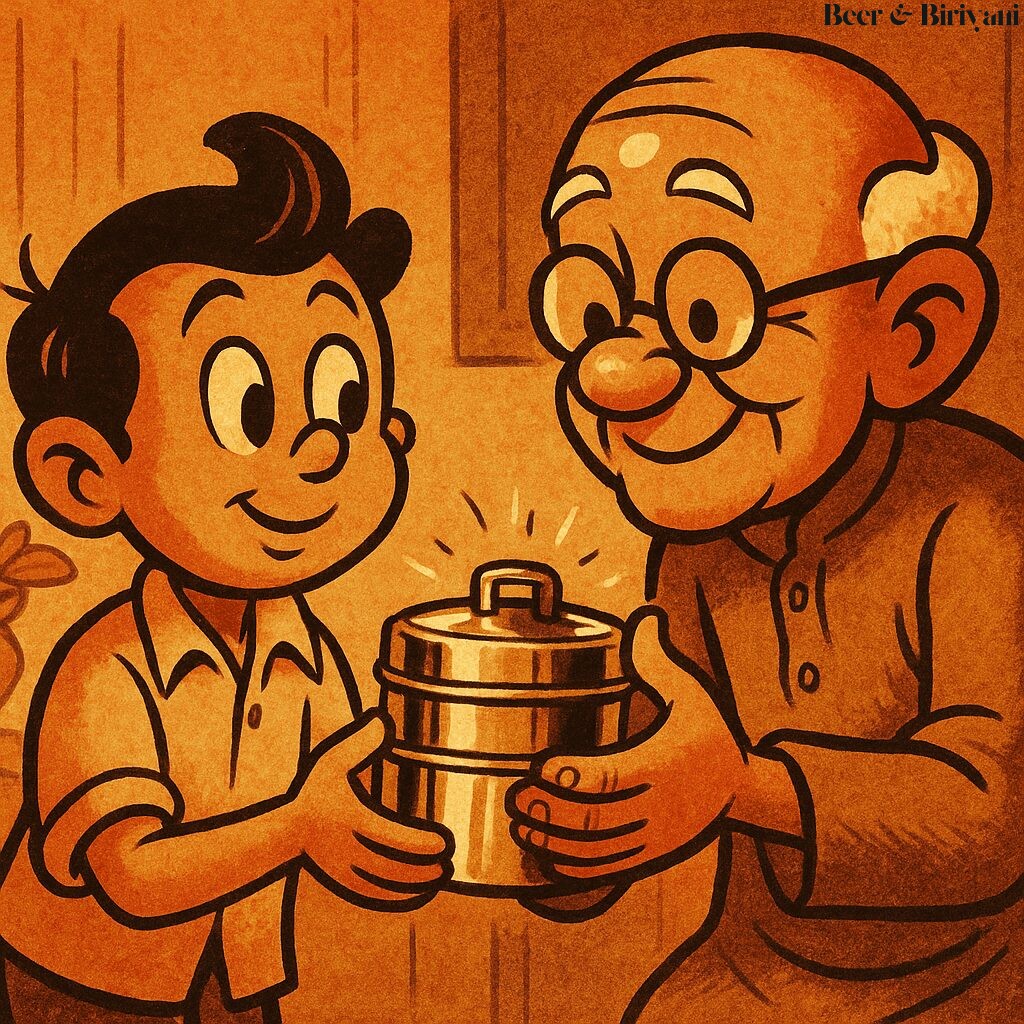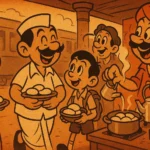Long after my grandfather stopped working at the Central Railway accounts office in Mumbai, his steel lunch box continued reporting for duty. Tucked neatly into a cloth bag that had once been white, it sat in the corner of our kitchen, polished from decades of use, a little dented at the edges, and still faintly smelling of kadi patta. He was retired. The box wasn’t.
It had a name in our house: “office dabba.” Not just a descriptor—a title. A rank. The box that had seen more monsoons than I had birthdays. That had traveled across train compartments, past CST’s echoing hallways, from home to desk and back, without ever losing a spoon or springing a leak. It was a container, yes. But also, somehow, a witness.
The Form and the Function
This wasn’t a fancy tiffin. It had no insulated handles, no collapsible design, no Instagrammable compartments. Just two sturdy layers and a tightly coiled latch that could survive both a local train crowd surge and a forgetful hand. The top tier always held the sabzi—karela, baingan, aloo-methi, dry and tempered. The bottom was for rice and dal or chapati neatly folded in triangles, each one soft and slightly charred, like a note from my grandmother saying “don’t forget who packed this.”
There were no labels, no compartments marked “protein” or “carbs.” Just flavor, proportion, and quiet care. Food that was less about nutrients and more about familiarity. No surprises. And therein lay the comfort.
The Object That Refused to Retire
After retirement, my grandfather insisted on using the same lunch box for his 1 PM meal. Even though he was now at home, ten feet from the stove. “Routine,” he said. “System.” But I knew it was something else. Dabba time was identity time. It was the rhythm of decades, packed neatly between stainless steel walls. Eating from the dabba was his way of staying in motion, even when life had asked him to slow down.
My grandmother played along. She continued packing it every morning. Half portions now. No rush. No deadlines. But with the same touch—the same layering of curry below roti, the same sweet pickle tucked in a foil corner. Some habits don’t fade. They just change jobs.
The Lunch Box as Legacy
When he passed, my grandmother wrapped the lunch box in newspaper and gave it to me. No ceremony. No explanation. Just, “You’ll use it properly.” I was in college. I had a plastic microwaveable box with a leak-proof lid. But I took it. And one day, on a whim, I packed it with leftover chole and jeera rice, clipped it shut, and took it to class.
At lunch, I unclasped the lid and immediately smelled cumin, ghee, time. A friend asked, “Why are you using that old box?” I didn’t have a good answer. Only that it made the food taste like something remembered.
The Patina of Time
The steel had darkened at the corners. A few spots were permanently discolored, and the lid didn’t fit as tightly as it once did. But it worked. Still functional, still dignified. Like many of our elders—quietly weathered, stubbornly useful.
There’s something to be said about objects that refuse to become relics. That continue living through new hands and newer kitchens. I’ve taken that lunch box to office jobs, road trips, and once even on a flight. TSA gave it a funny look. I wanted to tell them: it holds no threat—only turmeric, cumin, and the stubborn echo of someone who believed lunch should be home-cooked, timely, and uncomplaining.
What It Held, Really
What the lunch box really carried wasn’t food. It was a philosophy. Do the same thing well, every day. Take care of what you use. Feed others without asking for applause. And always return your box empty—not just because the food was good, but because it mattered.
Today, that dabba sits on a shelf in my Austin kitchen. I still use it once in a while, especially on days when I need anchoring. I open it, pack it, carry it—not because I need to, but because I want to remember. That a simple steel box outlived a job. Outlasted a generation. And somehow still serves, quietly, one lunch at a time.
Born in Mumbai, now stir-frying feelings in Texas. Writes about food, memory, and the messy magic in between — mostly to stay hungry, sometimes just to stay sane.












